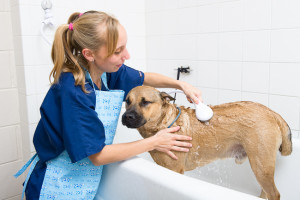
Call us Now ![]() +91-8744012053
+91-8744012053
Mon - Sat ~ 10:00 AM - 6:00 PM
Follow & Like
.png)


Call us Now ![]() +91-8744012053
+91-8744012053
Mon - Sat ~ 10:00 AM - 6:00 PM
Follow & Like
.png)


What causes allergies in Dogs and How to Deal with them?
There are three main types of allergies in dogs.
One of them is caused by environmental irritants and usually gets aggravated during autumn season which is around these transitional months of summer to winter. A dog with allergy is plagued by various symptoms such as itchy skin, red/watery eyes, sneezing, nasal discharge, swollen paws and ears. Offering immediate relief to the pup and understanding the exact cause of the allergy is important.

The use of medicinal drugs and antibiotics may be effective but not without side-effects. Antibiotics target the harmful bacteria but along with this it also destroys the good bacteria in the body. Image-cesarsway.com
Flea Allergy Dermatitis (FAD): Did you know that flea saliva causes terrible itching in dogs and is regarded as a potent allergen that can make any dog miserable. In case you’re dog is itchy and uncomfortable it is most likely allergic to flea saliva. You may think it’s a flea bite that is bothering the pooch but it’s the saliva that is the real culprit. Saliva of just one flea can wreak trouble on the dog and the condition (FAD) can persist even weeks after the death of this flea.

To prevent flea infestation make sure your dog’s coat is clean. Keeping the pooch dirty and not bathing it often is like an open invitation to fleas. Choose an organic shampoo for your pet dog that will also relieve the itchiness. Combing the flea infested pet daily becomes an important chore not to be skipped. ( image-pinellasvet.com)
Use a flea comb and place a light colored towel under the dog while you do so, this way you will know what’s coming out of the dog’s coat/skin.
How about using an organic spot-on flea and tick repellent on the dog? An organic product will be free of chemicals and insecticides. Also you will not be putting the pup under the risk of cancer as is the case with other chemically laced fleas & tick control solutions. One application lasts for about four weeks.
Allergens found in the Environment: Environmental allergies can be triggered by irritants present outdoors as well as inside the home. Outside allergens include pollen, certain plants, and grasses. Inside the home mold spores, dust mites, home cleaning agents with chemicals in them, and certain fabrics can bother the pet.

Vacuum clean your home regularly and use non-toxic cleaning agents. Indoor air quality can be improved by not smoking inside and especially not around the pet. Don’t forget to wash your dog’s bedding at least once a week.Image-Pinterest
Tackling the outdoor allergens will include wiping your dog’s paws before it steps inside the home after each of its outdoor visit. Very minute particles tend to cling on to the animal’s fur and paws, gently clean its paws using a towel or pet wipes before it enters the home so that an allergic reaction can be averted. Regular baths also help in washing away allergens in the pet’s skin and soothing any skin irritation.

Regular baths also help in washing away allergens in the pet’s skin and soothing any skin irritation. Image-www.dailymail.co.uk
Is your Dog Allergic to food? A pooch that is allergic to something in its food will show not only digestive disorders but also an itchy skin, irritated eyes, coughing, nasal discharge, sneezing, red-swollen ears and puffed-up paws. If you suspect your dog suffers from a food allergy consult the veterinarian. There is a saliva test that can determine the ingredient responsible for the allergy. Some dogs are allergic to milk, eggs, corn or wheat. Choose a diet for your dog that will help to detoxify and clear the allergens from the body.
Feed your pet a superior quality dog food prepared especially for its breed type, free of artificial coloring and flavors. Also food with added sugar and moistening agents may be avoided. The water you offer to the dog must be clean and high quality that is free of contaminants.
 Pets too, need variety in their diet. If you are feeding a certain dog food brand or formula daily for months and years, it can cause the pup to eventually develop a food allergy.
Pets too, need variety in their diet. If you are feeding a certain dog food brand or formula daily for months and years, it can cause the pup to eventually develop a food allergy.
It could develop sensitivity to carbohydrates or grains in the food or the canine canine could get sensitive to the single protein source in his/her diet. Antibiotics could be present in the meat and this can cause the immune system of the animal to over-react.(image-sterishoe.com)
Avoid over-medication and over-vaccination for the pet. Vaccines make the pet’s immune system more active. Over-vaccination will lead to an over-reactive immune system that will obviously cause allergic reactions.
Article resource: https://healthypets.mercola.com/